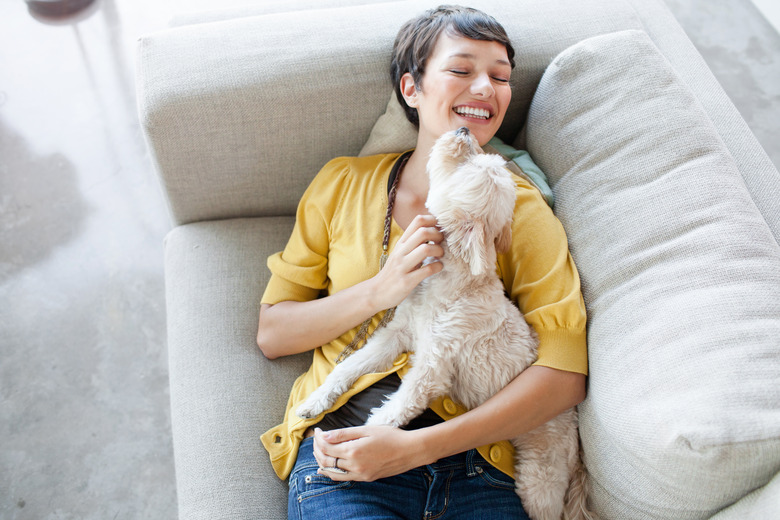How To Deal With A Female Dog In Heat
If you are reading this because you googled "my dog is in heat and bleeding everywhere," you're not alone. Unspayed female dogs experience through hormonal changes that affect their behavior both before, during, and after each heat cycle. Bleeding is one of the unpleasant associations dog owners have to deal with when they care for dogs that have not been spayed or neutered.
Beginning and ending menstruation
Beginning and ending menstruation
The AKC explains that female dogs typically reach sexual maturity and have their first "heat," or estrus or menstruation cycle, around six months old. It is during this time that the female's ovaries release their eggs, and she is physically ready to become pregnant.
Some dogs may be as young as four months when this happens, but large-breed dogs may be as old as two years before their first heat. But at what age do dogs stop menstruating? Older female dogs never really stop going into heat, but the AKC says that the length of time in between their cycles will increase as they get older.
Frequency of heats
Frequency of heats
The AKC says that large dogs such as a Saint Bernard may only go into heat once per year. Smaller dogs may experience heat three or four times per year. It can take a dog up to 18 months before their cycle becomes regular enough to be predictable.
According to Banfield Pet Hospital, the dog's heat cycle happens on the average twice a year. There is not a "season" for when your dog will be receptive to mating. Each time your dog goes into heat, the cycle will last about 21 to 28 days. However, each dog is slightly different.
Female dog behavior during heat
Female dog behavior during heat
Your female dog behavior during heat is probably what got you to say "my dog is in heat and bleeding alot." The AKC reports a variety of physical female dog behavior during heat, including increased urination. When she does urinate, you will likely notice that her vulva is swollen and her urine has a bloody tinge.
Behaviorally, she may be more distracted. She may signal her interest in male dogs by "flagging," which is moving her tail to expose her genitals. Blood during an estrus cycle starts out strong red and becomes pink as it diminishes.
During the active phase of estrus an intact male dog will be able to smell her pheromones for miles. A male dog might do just about anything to get close to your female dog, so keep them separated unless you really want puppies. Also, other female dogs may be aggressive to your female dog in heat.
Female dog behavior after heat
Female dog behavior after heat
According to Banfield, there are three stages of estrus. The first stage, proestrus, is when the vulva begins to swell. This is the period of the bloody vaginal discharge and increased urination. The second stage, estrus, is when a mating attempt is likely to result in pregnancy. Vaginal discharge will change from bloody to clear or brown.
The final stage, diestrus, is when the cycle is ending and your dog won't be interested in mating anymore. Female dog behavior after heat ends goes back to normal. Your dog will continue to be interested in males until the estrus is completely over.
Home remedies for dog in heat
Home remedies for dog in heat
Home remedies for a dog in heat are typically just management, not a solution. According to Hills Pet, the two biggest concerns from a dog in heat are unwanted behavior from both make and female dogs, and the bleeding that is associated with the ovulation. Keep her on a leash when outside, and don't let her outside unsupervised. Even if your dog is under control, the smell of a dog in heat can trigger aggressive behavior in other dogs.
The bleeding can be controlled by investing in some doggy diapers that your dog can wear while she is around the house. If you can, keep her off the furniture, and perhaps leave her in a part of the house that has floors that are easy to clean, rather than carpet or rugs. If you don't want to have to wash her bedding on a regular basis, put down an extra layer of towels that you can easily wash.
Always check with your veterinarian before changing your pet's diet, medication, or physical activity routines. This information is not a substitute for a vet's opinion.
